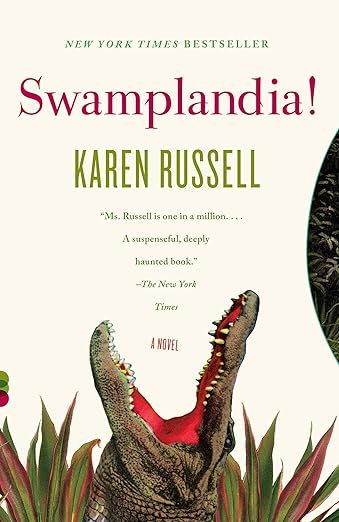
Swamplandia was published in 2011 and was a finalist for the Pulitzer Prize for fiction in 2012. I started reading this book several times since then and finally finished it. It is difficult to sum it up without mentioning all the allusions to and metaphors for hell. Russell describes the swamps of Florida as the underworld.
The book’s fictional competing theme parks are Swamplandia and World of Darkness. The customers at World of Darkness are called Lost Souls, and the Swamplandia owners’ dream is to create Carnival Darwinism. I wondered whether Russell was intimating that Florida is hell or that the white settlers created hell with their flagrant disregard for environmental safeguards. Besides making satiric comments about the haphazard development of Florida lands, she lampoons the concept of homeschooling by creating three homeschooled teenagers who are clueless about the ways of the world, away from their swamp home.
The featured family, led by Grandpa Sawtooth, is a quintessential failed coal miner who came to Florida to reinvent himself. Grandpa, a white man, takes on the persona of a fake Native American and calls his family Bigtree. His son, Chief Bigtree, and Hilola are the parents of three children: Ava, Osceola, and Kiwi. They own and operate a theme park called Swamplandia, where the main attraction is alligator wrestling; the mother, Hilola, is the show’s star.
Ava Bigtree, the youngest of the three Bighorn children, is the storyteller. Ava is thirteen at the start of the tale, and she and her siblings are devastated when their mother dies of cancer. They are grieving for their mother, and the family business is also virtually defunct without the mother’s nightly alligator show. Each Bigtree child experiences darkness in their efforts to cope, and each manifests grief in unusual ways, leading to a fascinating and unusual story. Osceola begins dating ghosts, and Kiwi leaves the island for the mainland and tries to support himself and his family by working at World of Darkness. Ava nurtures a pet alligator and remains in the dysfunctional family’s home even after her father goes to the mainland to work. Her siblings provide little physical or emotional support.
Using magical realism and extraordinary imagination, Russell includes multiple concepts and themes in this family and Floridian tale. Serious issues are addressed ludicrously, forcing the reader to consider the preposterous as well as reality. For instance, the environmental destruction of Florida is highlighted throughout the book from different perspectives. Swamp living, poverty, education, and tourists figure prominently in Russell’s narrative. There is also a focus on mental health, assault, and lots of hellish, dark topics as three youngsters come of age.


